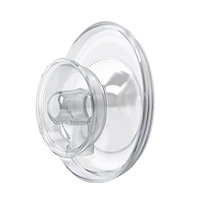The terms may differ — some people call it “mummy brain”, while others have dubbed it “pregnancy brain”, “baby brain”, or — and this is our personal fave — “mumnesia”.
What gives? Is parenthood going to turn your mind to mush? Does raising a newborn doom all those hard-earned IQ points to plummet?
Well, no, not exactly — it’s a little more complicated than that.
Postpartum brain fog is a real thing, but if you’ll pardon the pun, it’s nothing to lose your marbles over.
Is baby brain brain real?
Yes — very real!
Numerous studies have delved into the phenomenon of “baby brain” or “mummy brain”. And while it’s not entirely understood, researchers do agree that cognitive changes during and after pregnancy do happen.
For example, one study published in Nature Neuroscience found that pregnancy causes long-lasting structural changes in the brain — including the areas related to social cognition, bonding, and memory. And since around 80% of mums report some degree of memory loss, this might explain why many parents are far more adept at attending to their baby’s needs rather than, say, remembering where they put their car keys…
But before you start despairing, it’s important to know that these changes aren’t permanent. Your intelligence won’t suddenly take a nose dive. In fact, some parents don’t notice any cognitive decline whatsoever, and while you might notice changes in some areas, these neural shifts also correlate with nesting behaviors and parental bonding.
In other words, it’s best to think ofbaby brain as more of a temporary rejig — a reallocation of grey matter resources, pumping more power to the more crucial parts of the brain.
What causes baby brain?
There’s no single cause of baby brain, and because research is rather limited, pinpointing the most likely factors is more educated guess than evidence-based, but at present, science puts it down to:
Hormonal changes: Pregnancy and postpartum bring about significant hormonal shifts, particularly in oestrogen and progesterone. These hormones can affect brain function, mood, and memory.
Sleep deprivation: Let’s face it — uninterrupted sleep is nigh-on impossible with a newborn, and being sleep deprived can have a profound impact on cognitive function, making it harder to concentrate and remember things.
Stress and anxiety: Caring for a baby can be stressful, and chronic stress can impair your ability to focus and process information.
Changes in priorities: Your brain is rewiring itself to prioritise your baby’s needs, which might mean other things temporarily take a backseat.
Physical and emotional exhaustion: The physical toll of pregnancy, childbirth, and caring for a newborn can leave you feeling mentally drained.
What are the symptoms of mummy brain?
The symptoms of mummy or baby brain can feel a bit like the mental equivalent of walking through a foggy field: everything’s a bit slower, a bit harder to grasp. You might find yourself blanking on names, dates, or even why you walked into a room; arguably one of the most frustrating aspects of the whole experience.
Of course, the symptoms — and their severity — differ from one mum to the next. On top of forgetfulness, you might feel a general sense of mental sluggishness. Concentration might take a hit — things like reading a book or focusing on a task can feel far more taxing than usual.
How to manage the symptoms of baby brain
You might not be able to prevent postpartum brain fog, but fortunately, there are plenty of ways to manage the symptoms. For example:
Get plenty of sleep
Yes, we know this is easier said than done when you’re up all night feeding or soothing your little one. But, if at all possible, try to sleep when your baby sleeps, even if it means taking naps during the day. Sleep is essential for cognitive function, and even small increments can make a difference.
If your baby’s restlessness is keeping you up at all hours, you might also want to check out our guide to encouraging self-soothing — it’s packed with tips on helping your tot get a good nights’ rest.
Stay organised
Try to write things down, set reminders on your phone, or use a planner to keep track of appointments and to-do lists. Apps like Google Keep or Notion can be lifesavers for managing the chaos of parenthood, but your solutions don’t need to be high-tech. Post-it notes, wall calendars, or even just a hastily scribbled message on the back of your hand — use whatever works for you!
Exercise regularly
Even just a simple stroll around the block can do wonders for your mental clarity. Exercise boosts endorphins and improves blood flow to the brain, helping to alleviate stress and improve focus. Giving your tot a little outdoor time can help to regulate their sleep cycle, too — improving your chances of catching a few more ZZZs of your own!
Eat brain-boosting foods
A balanced diet rich in omega-3 fatty acids (found in salmon and walnuts), antioxidants (like berries), and whole grains can support brain health. Supplements are an option, too — but always check that they’re safe to use while pregnant or breastfeeding, and consult your doctor just to be on the safe side!
Stay hydrated
Dehydration is notorious for exasperating brain fog, so don’t forget to drink plenty of water! The NHS recommends that adults should drink 1.2 litres of fluids per day — around 6-8 glasses.
What does brain fog feel like?
Brain fog is often described as a mental cloudiness or a sense of being “out of it”. You might feel like your thoughts are moving through treacle, or that you’re constantly one step behind. Tasks that once felt second nature may now seem daunting, and you might find yourself forgetting even the simplest things, like why you walked into a room.
How long does postpartum brain fog last?
There’s no definitive timeline for how long baby brain lasts, as it varies from person to person. For some, the symptoms begin to improve a few months after giving birth, while for others, they may linger for up to a year or more. Factors like sleep, stress levels, and overall health can all influence how quickly you recover.
The good news is that your brain does bounce back. The cognitive changes associated with pregnancy and postpartum are temporary, and some studies suggest that having a baby may even enhance certain skills, like emotional intelligence and multitasking, in the long run.
Baby brain, while frustrating, is an inevitable part of most mums’ parenting journeys. Instead of trying to fight it, it’s better to embrace the change, and adapt your daily habits to lessen the impacts as best you can. With time, a little patience, and plenty of self-care, the dreaded brain fog should lift — it might just take some time, so hang in there!











 6 minute read
6 minute read